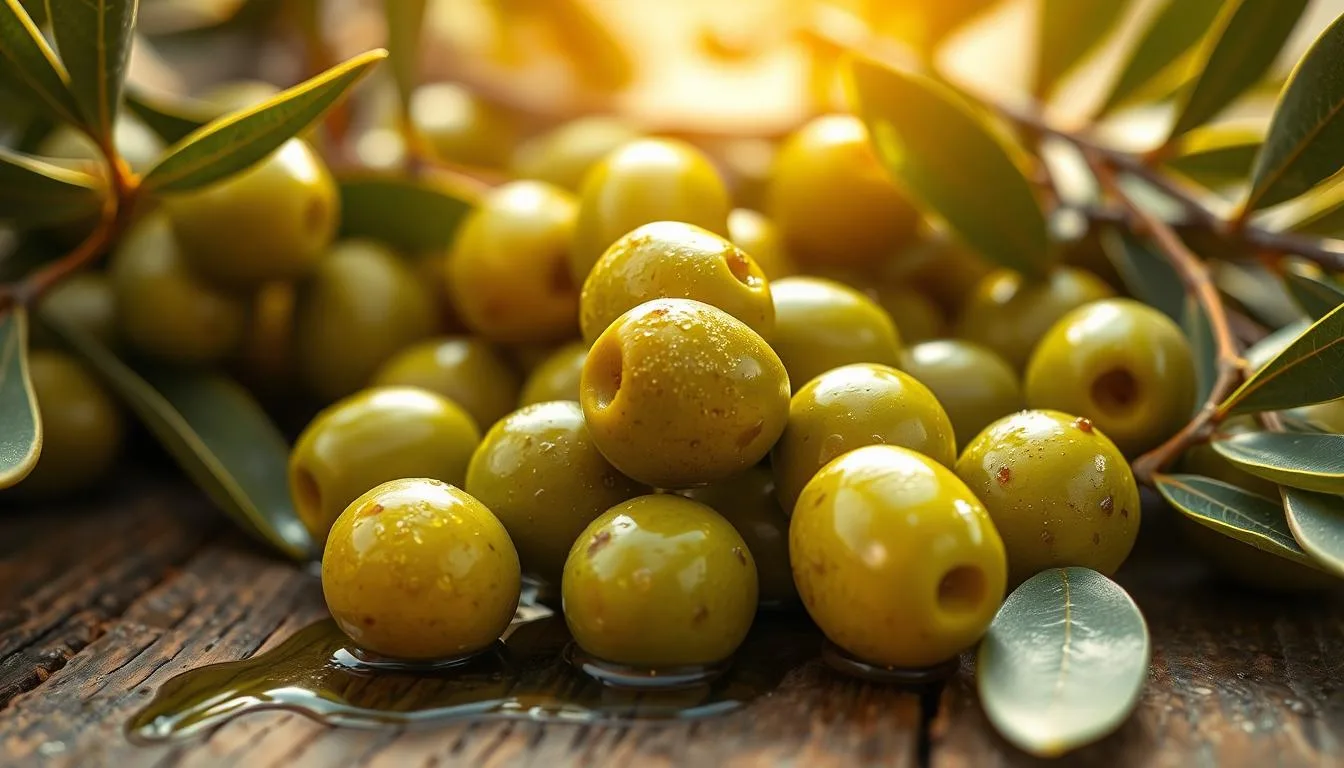Discover the authentic taste of green olives, a Mediterranean staple. I’ll show you how to select, serve, and savor these briny gems that add zesty flavor to any meal.
Table of Contents
Ever wondered why green olives from the Mediterranean are so special? They mix flavors from salty brine to meaty texture. This makes them a favorite in cooking around the world. As a home cook, I love how green olives can make any dish better.
What draws us to green olives? Is it their long history, how they’re picked, or the top-quality varieties? We’ll dive into the world of green olives. We’ll see how they can change your cooking.
Key Takeaways
- Discover the rich history and cultural significance of Mediterranean green olives.
- Learn how to select the best premium green olives for your culinary creations.
- Explore the nutritional benefits and health advantages of incorporating green olives into your diet.
- Understand the versatility of green olives and how to pair them with complementary flavors.
- Discover innovative ways to incorporate green olives into modern cuisine and fusion dishes.
Understanding the Mediterranean Olive Heritage
Olives have been loved in Mediterranean cuisine for thousands of years. These fruits have fed civilizations and shaped food in Greece, Italy, and Spain.
Ancient Origins and Cultural Significance
The olive tree started in Asia Minor and spread to the Mediterranean. By 3,000 BC, olives were on Crete. They were also in ancient Egyptian tombs from 2,000 years BC.
The Phoenicians brought olives to Southern Europe and Africa. They gave this gift to the early Greeks and Romans.
Traditional Harvesting Methods
Olives are picked by hand, a hard work that picks them when they’re just right. This careful picking keeps their flavors and textures good. It makes the many types of olives in the Mediterranean.
Regional Variations
Every Mediterranean country has its own olives and ways to make them. Greece has Kalamata and Konservolia olives. Italy has Castelvetrano, Ligurian, and Gaeta.
France has Niçoise, Picholine, and Languedoc olives. Spain’s Arbequina, Manzanilla, and Verdial are famous. These differences make olive cultivation a big celebration of Mediterranean cuisine.
| Country | Olive Varieties |
|---|---|
| Greece | Kalamata, Konservolia |
| Italy | Castelvetrano, Ligurian, Gaeta |
| France | Niçoise, Picholine, Languedoc |
| Spain | Arbequina, Manzanilla, Verdial |
The Art of Selecting Premium Green Olives
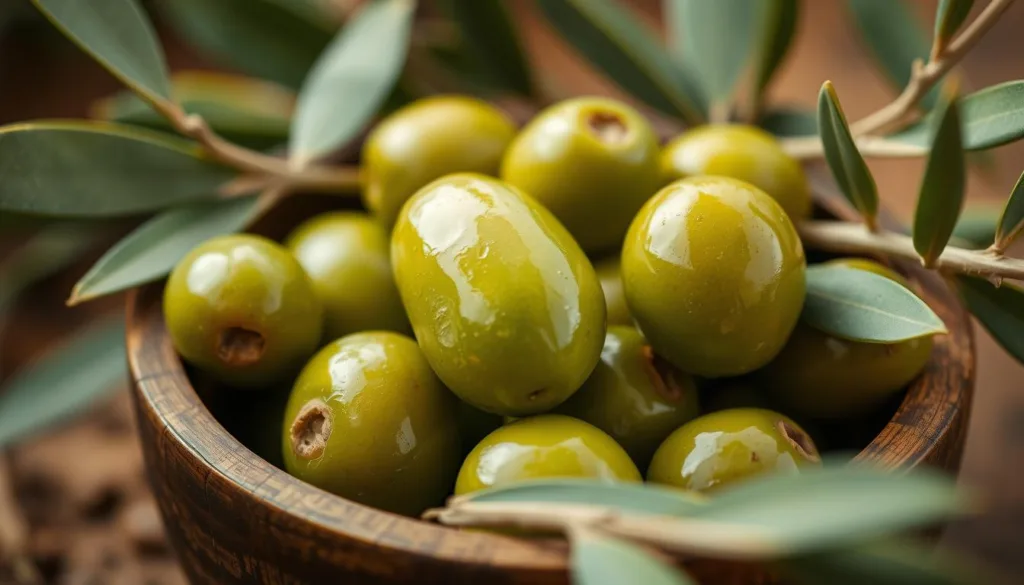
Choosing the perfect green olives is an art. As a big fan of olives, I’ve learned a lot. The key is to look at size, texture, and taste.
First, I check the size of the olives. The best ones are pitted, making them look nicer. Olives that are medium to large are usually the tastiest.
Then, I think about the type of olive. I love Castelvetrano for its buttery taste, Kalamata for its brininess, and Manzanilla for its tanginess. Mixing types can make the taste even better.
| Olive Variety | Flavor Profile | Typical Price Range |
|---|---|---|
| Castelvetrano | Buttery, slightly nutty | £59.55 for 5kg |
| Kalamata | Briny, slightly bitter | £3.13 for 210g |
| Manzanilla | Tangy, versatile | £30.64 for 3kg, £51.82 for 5kg |
Quality is also key. I look for olives without blemishes or damage. They should feel firm but soft, and taste balanced.
By focusing on these things, I always pick the best green olives. They’re perfect for salads, tapenade, or as a cocktail garnish.
From Tree to Table: Harvesting and Processing
Cultivating green olives is a detailed process. It goes from the orchard to the kitchen. I find the traditional ways of making these olives fascinating.
Optimal Harvesting Time
Green olives are picked when they’re not fully ripe. They should be firm and have a mild taste. This timing is key for their texture and flavor.
In the Mediterranean, farmers have tended to their orchards for generations. They know exactly when to pick for the best taste.
Traditional Curing Methods
After picking, olives go through a curing process. This removes their natural bitterness. Methods like brining or dry-curing change their flavor for cooking.
Brining can take up to 16 months. It involves soaking olives in salt water until they’re just right. Dry-curing uses sun, salt, and air for a similar taste.
Quality Control Measures
Quality checks are strict during harvesting and processing. Olives are sorted, de-stemmed, and checked for color, size, and quality. Only the best make it to the Mediterranean cuisine.
| Olive Cultivation Metric | Statistic |
|---|---|
| Oldest Olive Orchard | 400-year-old olive trees in Liguria, Italy |
| Ideal Growing Climate | Warm, sunny, and dry Mediterranean climate |
| Geographic Distribution | Europe (Italy, Spain, Greece, France) and California |
| Olive Tree Longevity | Hundreds of years |
Nutritional Benefits of Fresh Green Olives
Fresh green olives are key to a healthy diet. These include heart-healthy fats and antioxidants.
Green olives are rich in monounsaturated fats, like oleic acid. This fat is good for your heart. It helps keep cholesterol levels healthy. Eating green olives can lower heart disease risk.
Green olives also have lots of antioxidants. These fight off harmful free radicals. They can help prevent diseases like cancer and Alzheimer’s. The antioxidants in green olives, like oleuropein and hydroxytyrosol, are very beneficial.
Green olives are also low in calories but high in fiber. They make a great snack. They’re crunchy and can help you feel full. Plus, they’re good for your digestion.
Adding green olives to your meals can be a smart choice. They add flavor and nutrition. Your body and taste buds will love them!
- Green olives are a good source of healthy monounsaturated fats, which can help lower the risk of heart disease.
- They are packed with antioxidants, such as oleuropein and hydroxytyrosol, that can help reduce inflammation and protect against chronic diseases.
- Green olives are a low-calorie, fiber-rich snack option that can promote feelings of fullness and support digestive health.
- Incorporating green olives into a Mediterranean-inspired diet can provide a range of nutritional benefits.
Essential Guide to Olive Varieties
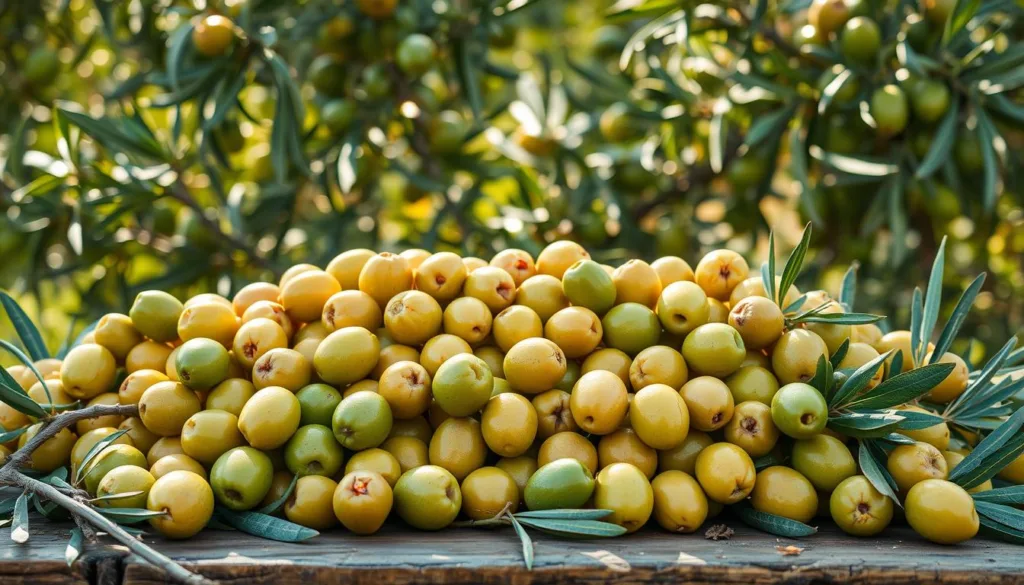
The Mediterranean region’s rich heritage is tied to olives. From the bright green Castelvetrano to the earthy Picholine and the delicate Manzanilla, each olive has a unique taste. These flavors can make your meals special.
Castelvetrano Olives
These bright green olives come from Sicily. They taste buttery and almost sweet. Their firm texture and slight brininess make them great for many dishes.
Picholine Olives
Picholine olives come from France’s Languedoc region. They are crisp and have a nutty, tangy taste. These green olives are perfect for salads, tapenades, and cheese platters.
Manzanilla Olives
Manzanilla olives are loved in Spain. They have a slight almond flavor and a firm texture. You can enjoy them as a snack, in cocktails, or in many Mediterranean dishes.
Exploring olive varieties is a fun trip through the Mediterranean’s culinary history. Whether you like the buttery Castelvetrano, the crisp Picholine, or the delicate Manzanilla, each olive can make your meals special.
Creating the Perfect Marinated Green Olives
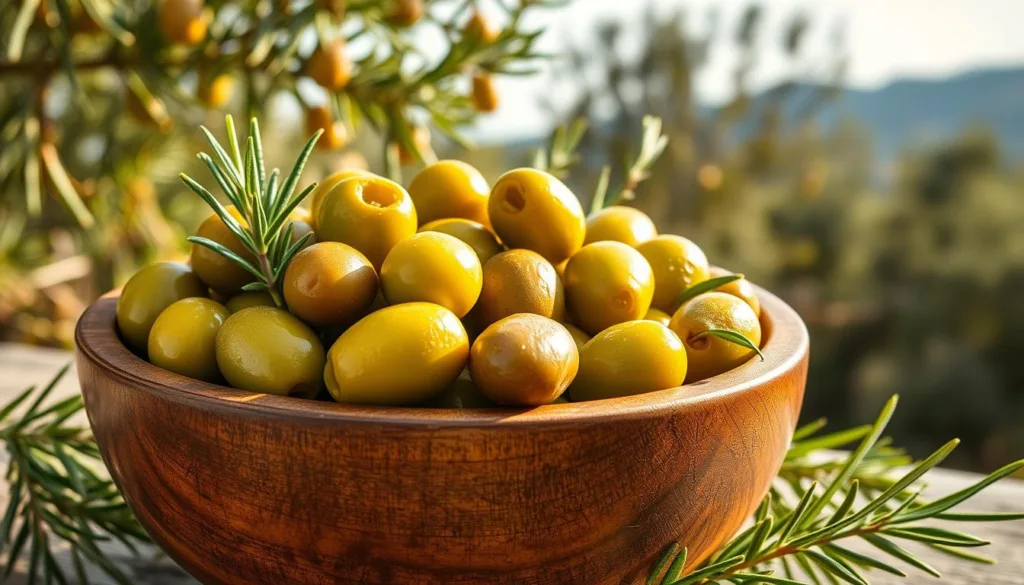
Marinating green olives is a simple yet flavorful way to elevate their taste. It turns them into a versatile ingredient for Mediterranean cuisine. You mix the fresh green olives with extra virgin olive oil, herbs, and a bit of acidity. This creates a mix of briny, pungent, and earthy flavors.
To make the perfect marinated green olives, start with 14 oz (400g) of pitted olives. Mix them with 1/3 cup (80ml) of extra virgin olive oil, 20g of finely diced parsley, and 4 thinly sliced garlic cloves. Add a strip of orange peel, a tablespoon of red wine vinegar, 1 teaspoon of dried oregano, and chili flakes.
Let the olives marinate for at least 2 hours, or overnight. This lets the flavors meld and the olives absorb the marinade. It makes the green olives taste better and adds to Mediterranean cuisine.
The marinated green olives are great as an appetizer, in salads, or with pasta, pizza, and meat or seafood. Their briny, pungent, and spicy notes are perfect with Mediterranean flavors. They make any meal more enjoyable.
| Ingredient | Quantity |
|---|---|
| Pitted green olives | 14 oz / 400g |
| Extra virgin olive oil | 1/3 cup / 80ml |
| Fresh parsley, finely diced | 20g |
| Garlic cloves, thinly sliced | 4 cloves |
| Orange peel, peeled in strips | 1 small |
| Red wine vinegar | 1 tablespoon |
| Dried oregano | 1 teaspoon |
| Dried chili flakes | 1 teaspoon |
| Salt and pepper | To taste |
By following this simple recipe and letting the green olives marinate, you can enjoy delicious Mediterranean flavors at home.
Pairing Green Olives with Mediterranean Flavors
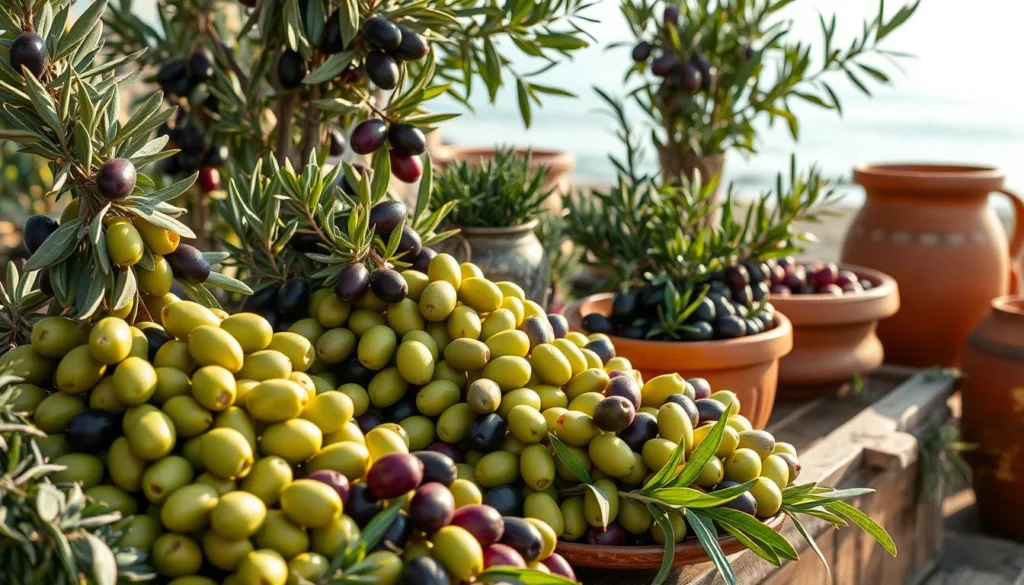
Green olives add a burst of flavor to many dishes. They go well with Mediterranean herbs and other ingredients.
Classic Herb Combinations
Green olives match well with Mediterranean herbs. Try them with rosemary, thyme, or oregano. These herbs bring out the best in the olives, making the flavors work together well.
Complementary Ingredients
Green olives also pair well with other Mediterranean foods. Add roasted almonds for crunch and honey for sweetness. Artisanal cheeses like Feta or Manchego make the dish even more special.
| Olive Variety | Complementary Ingredients | Flavor Profile |
|---|---|---|
| Castelvetrano | Fontinella cheese, Zinfandel wine | Bright green, buttery, mild |
| Cerignola | Garlic, capers, anchovies | Long, green, crisp, buttery |
| Kalamata | Red wine vinegar, red wine, olive oil | Deep purple, salty, pungent |
Exploring Mediterranean olives opens up new flavors. Home cooks can find amazing pairings with herbs and ingredients. This makes cooking fun and exciting.
Serving Suggestions and Presentation Ideas
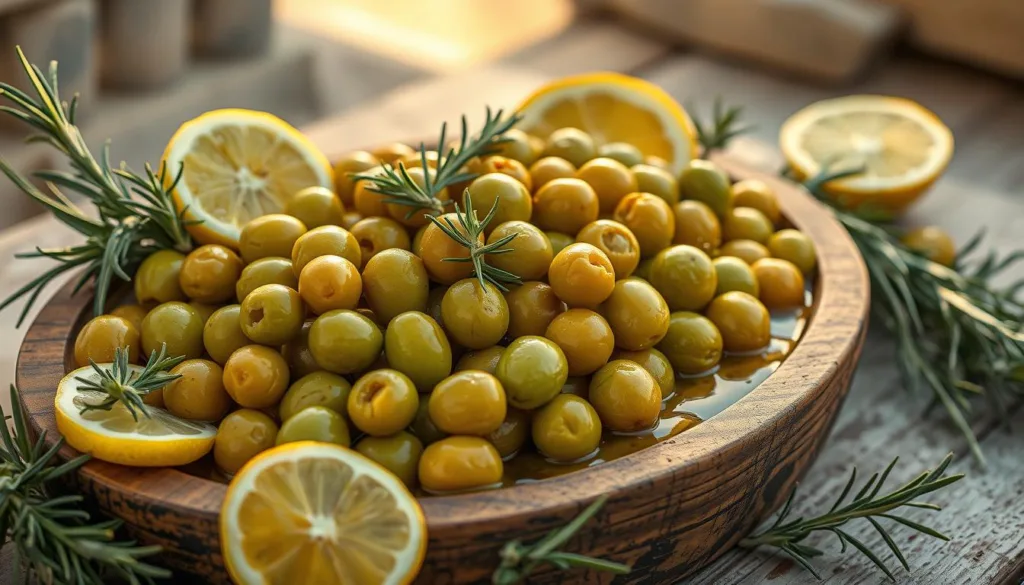
Green olives can make any dish better. They add a special touch to Mediterranean dishes and appetizers. You can serve them in many ways, making your meals more elegant.
One great idea is to put green olives on an antipasto platter. Mix them with bread, cheese, meats, and other Mediterranean foods.
For a simple yet fancy look, serve marinated green olives in a pretty dish. Their bright colors and tastes make them a great centerpiece. Add fresh herbs, citrus, or olive oil for extra elegance.
Green olives are also great in salads, pasta dishes, and pizzas. They add a salty taste and firm texture. They go well with many foods, like feta, tomatoes, meats, and cheeses.
Green olives are essential on charcuterie boards. Mix them with meats, cheeses, fruits, nuts, and bread. This makes a beautiful and tasty appetizer or light meal.
There are so many ways to serve green olives. Their bright color, strong taste, and Mediterranean vibe can make any dish better. Try different ideas and show off your creativity.
| Serving Suggestion | Presentation Idea | Complementary Ingredients |
|---|---|---|
| Antipasto Platter | Arranged in a decorative dish | Crusty bread, cheese, cured meats |
| Marinated Olives | Served in a shallow bowl with a small slotted spoon | Herbs, citrus zest, quality olive oil |
| Salads, Pasta Dishes, Pizzas | Incorporated directly into the recipe | Feta, tomatoes, meats, cheeses |
| Charcuterie Boards | Arranged alongside meats, cheeses, and other accoutrements | Dried fruits, nuts, crusty bread |
Green Olives in Modern Cuisine
In the world of food, green olives are becoming very popular. These tasty olives are now in many new recipes, mixing old flavors with new ones.
Contemporary Recipe Applications
Chefs are using green olives in many ways. They make olive oils and vinaigrettes that add special flavors to salads and veggies. They also use olives to make sauces and dips, adding depth to dishes.
Fusion Dishes
Green olives are great for making Mediterranean fusion dishes. They mix well with foods from other places, like Asian stir-fries and Latin American empanadas. These dishes are exciting and show how food can bring people together.
The green olive is now a key ingredient in cooking. It changes how we enjoy food, from traditional dishes to new, exciting ones. Its versatility shows the endless possibilities in modern cooking.
Storage Tips and Preservation Methods
Keeping your green olives fresh is important. Marinated olives can stay fresh for up to a week. They get even tastier over time.
For longer storage, use brine or olive oil. These methods keep the olives’ nutrients and prevent drying or spoilage.
Choose firm, even-sized olives for storage. Use 1 to 2 tablespoons per serving. To pit them, crack the olive with a knife and remove the pit.
| Olive Preservation Method | Shelf Life |
|---|---|
| Marinated olives in the refrigerator | Up to 1 week |
| Olives stored in brine or olive oil | Up to 1 year in the refrigerator |
| Olives from the olive bar | Up to 1 week |
| Jarred or canned olives | Up to 1 year in the refrigerator |
For a tasty homemade green olive recipe, you need: 1 1/2 lbs of fresh green olives, 1 carrot, 2 stalks of celery, 1 quart of white wine vinegar, 1 tablespoon of sea salt, 1/2 cup of water, and enough olive oil to cover the olives. Make 4 incisions on each olive.
Then, mix the vinegar, salt, and water. Pour it over the olives and cover them in olive oil. Let them cure without constant checking. You’ll get a delicious, brined food that lasts up to a year.
Health Benefits and Dietary Considerations
Green olives are a Mediterranean delight. They are full of health benefits. These benefits make them great for a balanced diet.
They are rich in monounsaturated fats. These fats are good for the heart. Green olives also have antioxidants like vitamin E and polyphenols. These help fight stress and inflammation in the body.
Heart-Healthy Properties
Green olives have monounsaturated fats, like oleic acid. This is good for the heart.
Studies show green olives can prevent LDL cholesterol from oxidizing. This is important for preventing heart disease.
Antioxidant Content
Green olives are full of antioxidants. They have vitamin E and polyphenols like hydroxytyrosol and oleuropein. These compounds fight free radicals and reduce inflammation.
The antioxidants in green olives are linked to many health benefits. They can improve brain function and lower the risk of diseases like cancer and neurodegenerative conditions.
Eating green olives can make your diet healthier. They add flavor to meals and support your body’s defenses against disease.
| Nutrient | Green Olives | Black Olives |
|---|---|---|
| Calories | 116 kcal | 145 kcal |
| Protein | 0.84 g | 1.03 g |
| Total Fat | 10.90 g | 15.32 g |
| Carbohydrates | 6.04 g | 3.84 g |
| Fiber | 1.60 g | 3.30 g |
| Vitamin C | 0.90 mg | – |
| Calcium | 88 mg | 52 mg |
| Iron | 6.28 mg | 0.49 mg |
Sustainable Olive Cultivation
I’m all about supporting sustainable farming that keeps the Mediterranean’s culture and nature safe. Olive farming is a big part of this, and I’m excited to see how farmers are using new ways to grow olives. This helps keep this important crop alive for future generations.
Water saving is a big deal in olive farming, like in Pakistan where water is scarce. Farmers there use smart irrigation and grow olives that need less water. Thanks to the OliveCulture project with Italy, they’re learning new ways to farm better.
More farmers are turning to organic farming for olives. They want to use fewer chemicals and keep their farms healthy. This helps the environment and makes their olives taste better. I’m happy to buy these olives and support these farmers.
FAQ
What are the key features of fresh green olives?
What is the history and significance of green olives in Mediterranean cuisine?
How do I select premium-quality green olives?
How are green olives harvested and processed?
What are the nutritional benefits of fresh green olives?
What are some popular green olive varieties and their characteristics?
How do I properly marinate green olives?
What are some classic flavor pairings for green olives?
How can I serve and present green olives?
How are green olives used in modern cuisine?
How should green olives be stored for optimal freshness?
What are the health benefits of consuming green olives?
How are sustainable olive cultivation practices implemented?
If you liked this article, you might also like :
- Low Carb Breakfast Recipes from our Breakfast category.
- Nacho Trays from our Lunch category.
- Fajitas de Pollo from our Dinner category.
Follow us on Facebook, Instagram, Pinterest, X and Youtube for the latest news, tips, and exclusive content.

